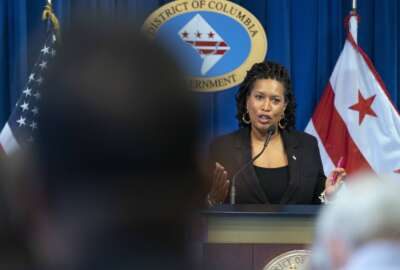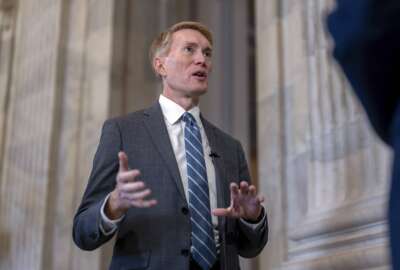Opening day for the 119th Congress
At the Homeland Security and Governmental Affairs Committee, former chairman Gary Peters (D-Mich.) is the new ranking member.
- The 119th Congress begins today and several key Senate federal workforce committees have new leaders. At the Homeland Security and Governmental Affairs Committee, former Chairman Gary Peters (D-Mich.) is the new ranking member. Over at the Armed Services Committee, Democrats tapped Jack Reed (D-R.I.) to be the ranking member. Sen. Richard Blumenthal (D-Conn.) takes the ranking member reins at the Veterans Affairs Committee while Sen. Edward Markey (D-Mass.) is the new Democratic leader of the Small Business Committee. Sen. John Thune (R-S.D.) is the new Majority Leader. The new chairmen of the committees are expected to be finalized in the coming days. (Senate Democrats name ranking members - Senate Democrats)
- The incoming chairman of the Senate Banking Committee is calling on the Treasury department to share details on its recent hack. Sen. Tim Scott (R-S.C.) wants to know when and how the incident occurred, the extent of the data that was accessed, and whether Treasury was aware of any of the vulnerabilities that allowed remote access to Treasury's systems. Scott is asking for answers by the end of next week. (Senator calls on Treasury Department to share recent hack details - Senate Banking Committee)
- House Republicans’ rules package for the 119th Congress has a key provision impacting federal employees. GOP lawmakers are proposing to hold over the Holman rule once the new Congress begins. It’s a provision that could let lawmakers reduce a federal employee’s salary, fire a specific employee, or cut a specific federal program. Advocates of the Holman rule have said it offers cost savings to the federal government. But Democrats are criticizing the holdover provision. Rep. Gerry Connolly (D-Va.) argues that the Holman rule is a way for Republicans to fire feds for personal grievances and political reasons. (Statement on Republican rules package for the 119th Congress - Rep. Gerry Connolly (D-VA))
- The majority of civilian federal employees got a 2% pay raise for 2025. But some will continue to see a pay freeze. The Office of Personnel Management confirmed that a pay freeze will continue for certain senior political officials, the vice president and others paid through the Executive Schedule pay system. The pay freeze for the Executive Schedule has continued for at least the last decade. Depending on the location, the pay cap also impacts certain higher-level General Schedule employees through pay compression. In more than half of locality pay areas, there’s at least one step of at least one pay grade that experiences pay compression and doesn’t receive the full raise amount.(Continued pay freeze for certain senior political officials - Office of Personnel Management)
- The Army is trying to ease a bit of its contractors' training compliance burden. New guidance from the service's chief information officer clarifies some of the DoD cyber training requirements for contractor employees. Most employees working under Army performance work statements won't need to meet DoD's "81-40" cyber workforce training qualifications. The guidance said it would be unnecessary and inappropriate to apply the training standards to PWS-type contracts, and the Army should maximize its use of those types of contracts.
- A new effort to better align the cybersecurity workforce is underway. Federal technology contracts will soon include new provisions that will line up cybersecurity workforce tasks, knowledge, skills and work roles with the National Initiative for Cybersecurity Education (NICE) Framework. The Federal Acquisition Regulatory Council's new proposed rule would fulfill a requirement in the May 2019 cybersecurity workforce executive order. The National Institute for Standards and Technology's NICE Framework is a nationally focused resource that categorizes and describes cybersecurity work. The objective of this proposed rule would be to strengthen the cybersecurity workforce on federal contracts on both the front end during requirements development and back end after award. Comments on the proposed rule are due by March 3.(FAR Council proposes cyber workforce rule - Federal Register)
- Former President Jimmy Carter made federal workforce reforms a key focus of his administration. Federal workforce groups say more change is needed. Carter signed the Civil Service Reform Act in October 1978, which created the Senior Executive Service and guaranteed collective bargaining rights for non-postal federal employees. He also signed legislation creating the departments of Energy and Education. Federal employee unions and good-government groups say Congress and the White House should revisit some of these policies nearly 50 years later. Carter also railed against red tape and excessive federal regulations. President-elect Donald Trump made regulatory cuts a key part of his first term and vows to double down on that in his second term. (Carter led major civil service reform. Nearly 50 years later, experts say more change is needed - Federal News Network)
- The federal government is making a long-term deal for its electricity needs over the next decade. The General Services Administration awarded its first long-term multi-agency electricity contract meant to lock in current energy prices and protect against rising costs. Constellation New Energy will provide power to agencies in the District of Columbia, the mid-Atlantic area and the Midwest. GSA said the contract meets the Biden administration’s green-energy goals and keeps up with increased electricity demand from data centers and AI facilities. (General Services Administration awards historic electricity contract - General Services Administration)
Copyright © 2025 Federal News Network. All rights reserved. This website is not intended for users located within the European Economic Area.
Michele Sandiford
Michele Sandiford is a digital editor at Federal News Network.






